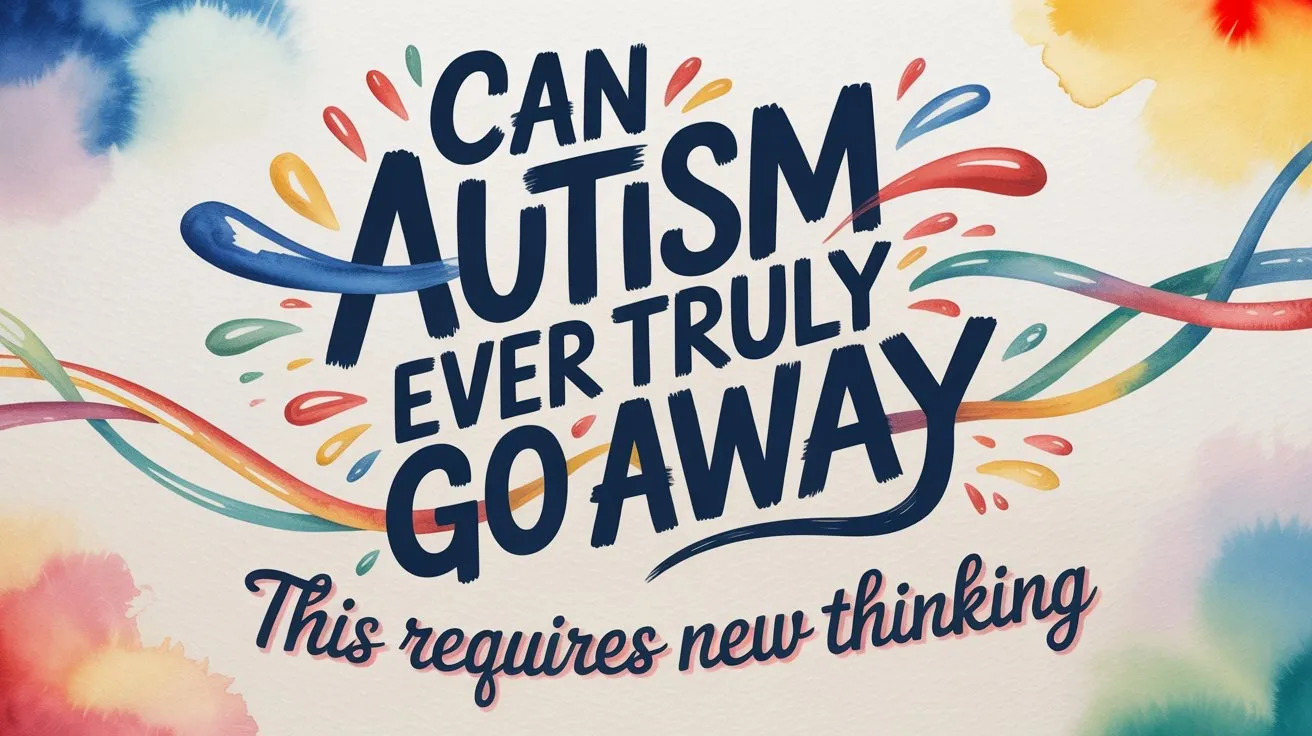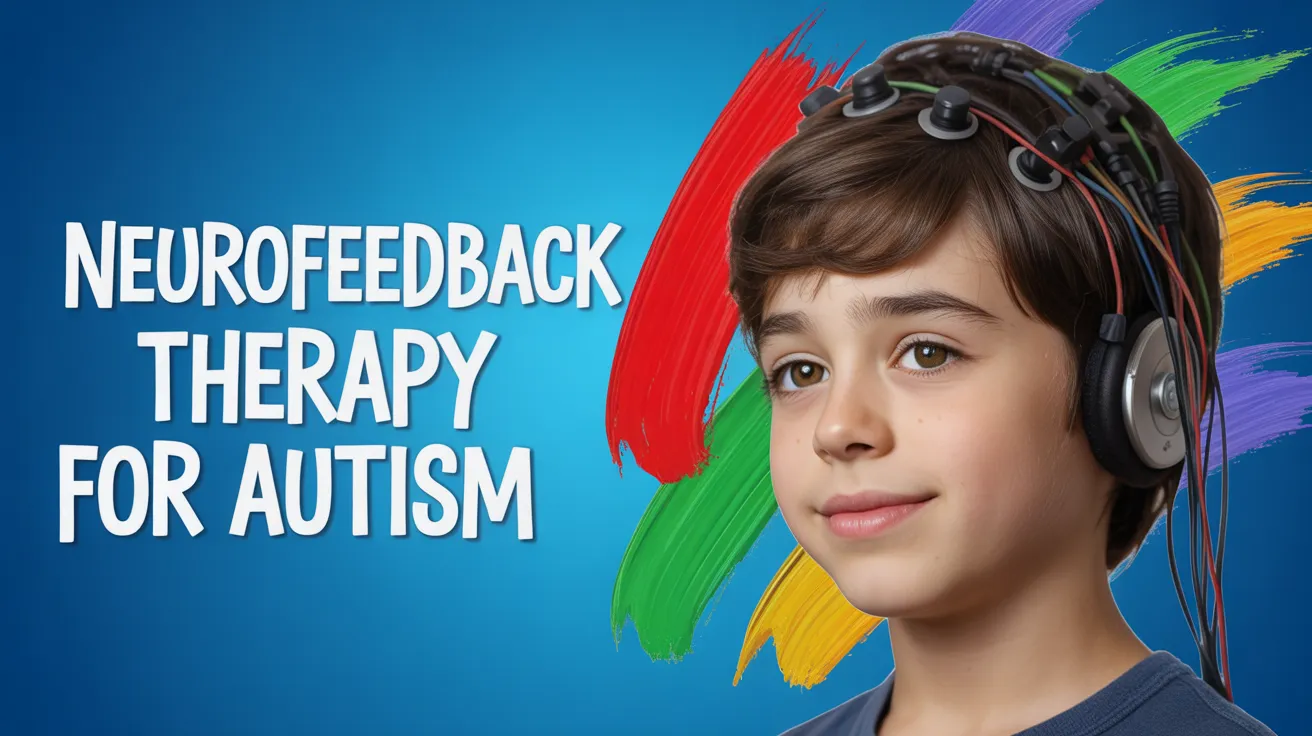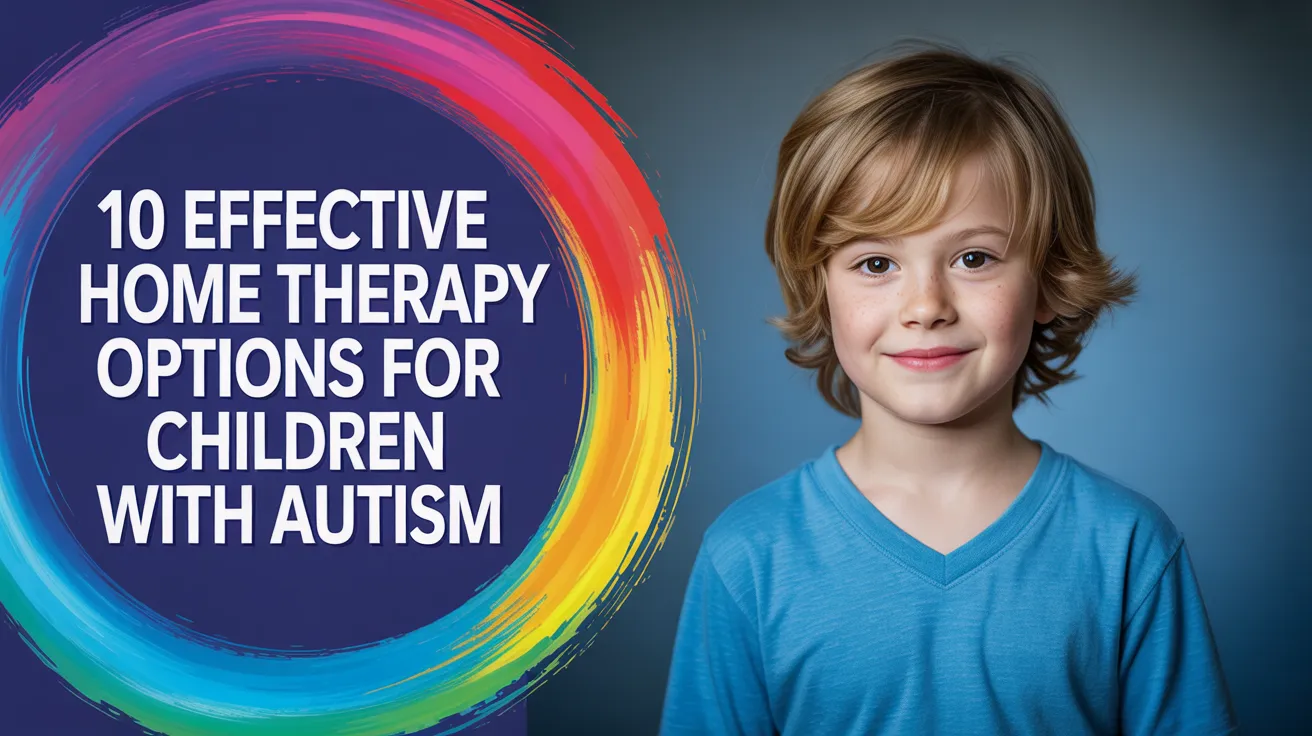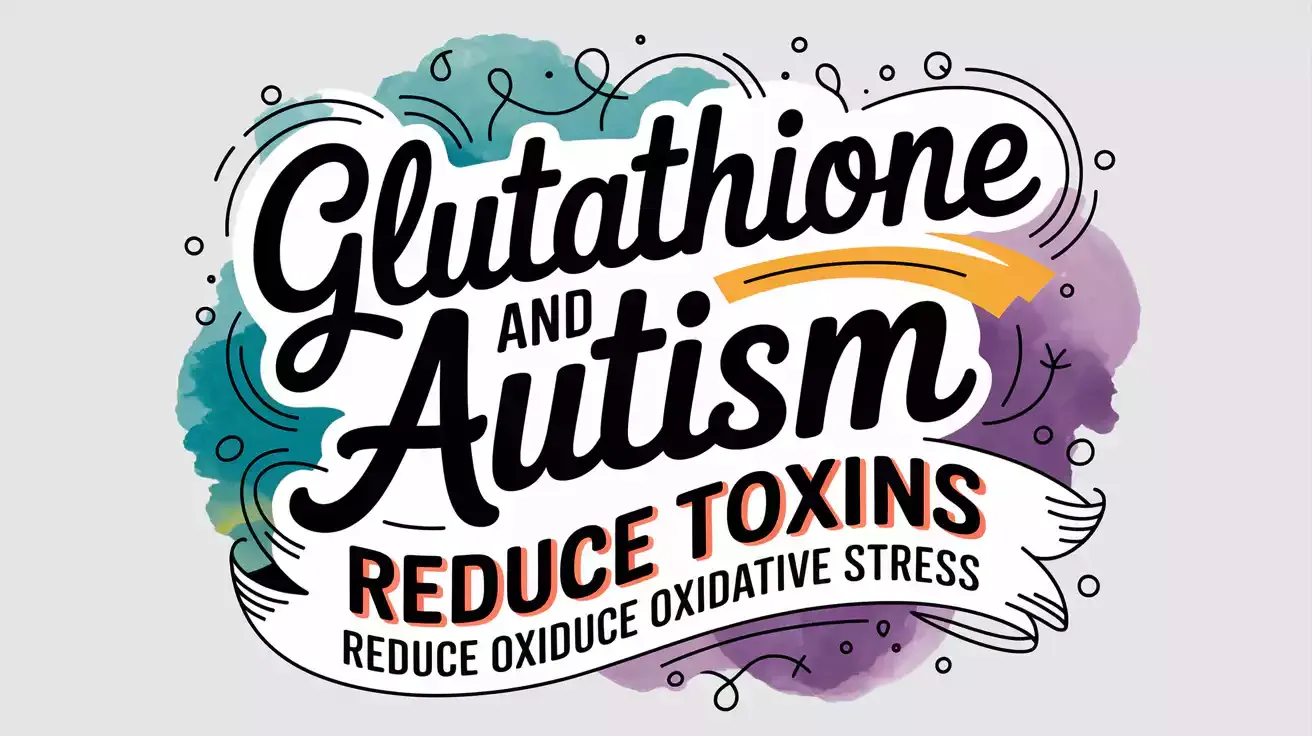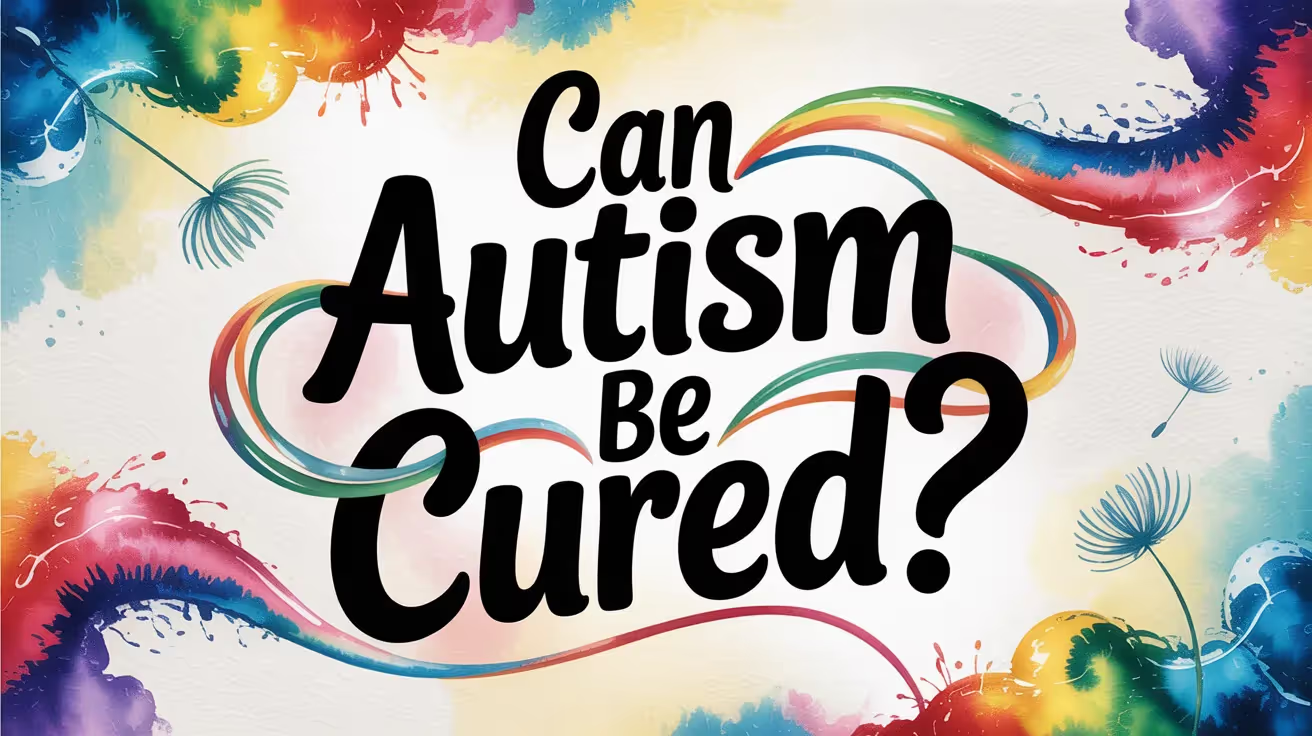As parents, we often find ourselves navigating a maze of questions and uncertainties regarding our children's journey with autism. One question that frequently comes up is: will autism go away? The truth is, autism is generally viewed as a lifelong condition, and current research indicates that there’s no definitive cure. However, the landscape of autism is complex, with symptoms varying widely among individuals. Many kids diagnosed with autism possess average or even above-average intelligence, which means their potential for growth remains bright.
It’s crucial to understand that while traditional views may suggest that autism doesn't just vanish into thin air, the approach we take can lead to significant improvements in health and behavior. Our focus should shift toward enhancing overall well-being through holistic methods—think diet modifications, lifestyle changes, and effective therapies at home. By improving health, many families have reported a natural reduction in various symptoms commonly associated with autism.
Research suggests that by minimizing inflammation, boosting mitochondrial function, and reducing toxin exposure, we can create an environment conducive to neuroplasticity—essentially helping the brain adapt and grow healthier pathways. This doesn’t negate the existence of autism but opens doors to managing its symptoms more effectively.
So while one might not find a magic wand to "cure" autism entirely, there are actionable steps parents can take to facilitate improvement in their children’s lives. After all, our goal isn't necessarily about making symptoms disappear; it’s about supporting our children in thriving within their unique landscapes.
Understanding Autism: A Lifelong Journey
Autism is often described as a lifelong journey, one that is as unique as each child who walks it. It’s crucial to approach autism not merely as a set of symptoms, but as a mosaic of strengths and challenges. Each child on the spectrum has their own special blend of abilities and needs, which can evolve over time.
Many parents wonder about the possibility of outgrowing autism or whether it's possible for symptoms to diminish significantly. While traditional medical narratives often emphasize that autism doesn't just 'go away,' it's important to recognize that improvement is not only possible but quite common through dedicated support.
The Role of Health in Autism Management
Improving your child's health can have profound effects on their experience with autism. Here are some lifestyle changes that can make a difference:
Anti-inflammatory Diet: Reducing inflammation plays a critical role in easing various symptoms associated with autism. Foods rich in omega-3 fatty acids, like those found in fatty fish or flaxseeds, may help combat inflammation and support cognitive function.
Mitochondrial Support: Mitochondria are the powerhouses of our cells, and enhancing their health can positively affect energy levels and overall well-being. Supplements like C15 Fatty Acid might be beneficial in supporting mitochondrial function.
Toxin Reduction: Lowering exposure to environmental toxins can lead to noticeable improvements. Simple changes such as using non-toxic cleaning supplies or choosing organic produce might help reduce your child’s internal toxin load.
A Holistic Perspective
When we talk about neuroplasticity—the brain's ability to adapt and rewire itself—diet and lifestyle choices play a pivotal role. By providing nutritious food and fostering healthy habits, you're setting the stage for your child to develop new skills and behaviors more effectively.
Your approach doesn’t have to be overwhelming; start small by incorporating one healthy change at a time. Gradually, you might notice improvements in areas such as social interaction or sensory processing—not because autism has disappeared but because you've created an environment that nurtures growth.
"It's not about making autism go away; it's about creating pathways for success within it." - A wise parent once said.
In summary, while the question remains: wil autism go away?, understanding that improvement is possible through healthful living may offer hope and practical strategies for families navigating this journey together. Remember, supporting each other makes all the difference!
The Role of Health in Managing Autism Symptoms
When it comes to managing autism symptoms, health plays a fundamental role. Many parents have noticed that when their children thrive physically, there’s a ripple effect on their emotional and cognitive well-being. This connection might feel like a hidden superpower: enhancing your child's health can lead to significant improvements in how they navigate the world.
The Power of Nutrition
One of the first areas to explore is diet. An anti-inflammatory diet can be a game-changer. Reducing sugar and processed foods while incorporating whole foods can lead to noticeable differences in mood and behavior. For instance, some studies indicate that children with autism may have heightened responses to sugar cravings, which could exacerbate symptoms. If you'd like to dive deeper into this topic, check out our article on Autism and Sugar Cravings: Causes and Solutions.
Inflammation: The Silent Saboteur
Chronic inflammation can overshadow many aspects of health, including brain function. By focusing on foods rich in omega-3 fatty acids and antioxidants, you can help reduce inflammation. Foods like salmon, walnuts, and leafy greens are excellent choices. Remember, when we tackle inflammation head-on, we may see improvements in communication skills and daily functioning.
Mitochondrial Health Matters
Don't forget about mitochondria! These tiny powerhouses are essential for energy production in our cells. Poor mitochondrial function can lead to fatigue and stress—conditions that often exacerbate autism symptoms. Supplements like C15 Fatty Acid may support mitochondrial health and boost energy levels.
A Toxin-Free Environment
Your home environment matters too! Reducing exposure to environmental toxins can create a calmer space for your child. Opt for natural cleaning products or consider air purifiers as part of your strategy. These small shifts might contribute significantly to reducing irritability or sensory overload.
The Road Ahead
Understanding that improving your child's overall health can lead to better management of autism symptoms is crucial. Every positive change you make is a step toward creating an environment where your child can flourish—not necessarily by making autism disappear but by supporting their unique strengths.
"Health isn’t just about avoiding illness; it’s about thriving." - A mantra worth remembering!
Ultimately, while the question remains: wil autism go away?, focusing on health opens up new avenues for growth and happiness for both you and your child.
Reducing Inflammation: A Key Strategy
Reducing inflammation is an often-overlooked but crucial strategy in supporting children with autism. Inflammation can be like that unwelcome guest who overstays their welcome, creating chaos in our bodies and minds. Research indicates that chronic inflammation can exacerbate symptoms, making it essential to tackle this issue head-on.
So, how does inflammation connect to autism? Well, when the body is in a state of inflammation, it can impact brain function, leading to challenges with communication and behavior. A study from the National Institute of Mental Health highlights how inflammatory responses can alter neural development and impact individuals on the spectrum. By reducing inflammation through diet and lifestyle changes, we may foster a more supportive environment for neuroplasticity—the brain's natural ability to adapt and grow.
Dietary Changes That Make a Difference
One of the most effective ways to combat inflammation is through an anti-inflammatory diet. Here are some powerful players you might want to include:
Omega-3 Fatty Acids: Found in fatty fish like salmon or plant sources like flaxseeds, omega-3s are known for their anti-inflammatory properties. These healthy fats help modulate the body's inflammatory response and support overall cognitive function.
Fruits and Vegetables: Rich in antioxidants and phytochemicals, colorful fruits and veggies (think berries, spinach, and broccoli) help shield the body from oxidative stress—another contributor to inflammation.
Avoiding Processed Foods: Highly processed foods packed with sugar and unhealthy fats can trigger inflammatory responses. Keeping the pantry stocked with whole foods is a step in the right direction!
The Power of Mitochondrial Health
Don’t underestimate your mitochondria! These tiny organelles are responsible for producing energy at a cellular level. When they’re not functioning optimally due to inflammation or toxins, fatigue and stress levels rise—leading to intensified autism symptoms. Supporting mitochondrial health through dietary supplements like C15 Fatty Acid may promote better energy production and overall well-being.
Cleansing Your Environment
Your home environment plays an essential role too! Reducing exposure to toxins can significantly lower inflammation levels within the body. Simple practices such as using non-toxic cleaning supplies or opting for organic fruits and vegetables can make a world of difference.
"Sometimes the smallest changes take the greatest effort." - Unknown but oh-so-true!
In conclusion, while we may ponder if wil autism go away, we must remember there’s no universal answer—what we can do is create conditions that empower our children to thrive. Addressing inflammation through thoughtful dietary choices, improving mitochondrial health, and curbing toxin exposure may not erase autism but could lead to remarkable improvements in health and well-being.
Boosting Mitochondrial Health for Symptom Improvement
When it comes to autism, one aspect that often gets overlooked is mitochondrial health. Think of mitochondria as the tiny batteries in our cells. They provide the energy necessary for everything we do, from basic movements to complex cognitive functions. Research suggests that many individuals with autism may experience issues related to mitochondrial dysfunction, which can exacerbate symptoms and affect overall well-being.
Why Mitochondrial Health Matters
Studies indicate that improving mitochondrial function can lead to better energy levels and a more balanced mood. When these powerhouses are not working properly, fatigue, irritability, and cognitive challenges can arise, making everyday life even tougher for your child.
By focusing on boosting mitochondrial health, you're not just addressing one symptom; you're creating a ripple effect that can enhance various areas of your child's life. For example:
Improved Energy Levels: Children who experience fatigue may have a harder time participating in social situations or learning new skills. Better mitochondrial function means more energy for playdates and classroom activities.
Enhanced Mood Stability: A boost in energy often correlates with an uplifted mood. Children may feel less irritable and more engaged with their surroundings.
Cognitive Benefits: Healthy mitochondria contribute to improved focus and attention span, which are crucial for effective learning.
Nourishing Mitochondria through Diet
The great news is that you can support your child’s mitochondrial health through diet! Here are some dietary strategies you might consider:
C15 Fatty Acid: Rich sources of C15 fatty acids can be particularly beneficial for mitochondrial health. This type of fatty acid is known to support energy metabolism and is found in certain foods like coconut oil or can be taken as a supplement.
Amino Acids: The building blocks of proteins help fuel mitochondria. Foods high in protein like lean meats, fish, eggs, and legumes should be staples in your child’s diet.
Antioxidants: Include plenty of fruits and vegetables rich in antioxidants—think blueberries, spinach, and sweet potatoes—to combat oxidative stress that could harm mitochondrial function.
Toxin Reduction for Mitochondrial Support
Mitochondria also suffer when exposed to toxins from our environment. Reducing toxin load can help these little power plants do their job better. You might want to consider:
Natural Cleaning Products: Swap out harsh chemicals for non-toxic alternatives at home; this simple change can cut down on exposure to harmful substances.
Organic Produce: Opting for organic fruits and vegetables minimizes pesticide exposure—better for your child's health overall!
"Small changes lead to big results!" - A motto worth adopting!
In summary, while the question remains: wil autism go away?, focusing on enhancing mitochondrial health through dietary choices and lifestyle adjustments can lead not only to symptom improvement but also foster a happier, healthier lifestyle for your child. Taking these steps empowers you as a parent to create a nurturing environment where your child can thrive—one tiny battery at a time!
The Importance of Reducing Toxin Load
Reducing the toxin load in your child's environment is a vital step toward enhancing their overall health and managing autism symptoms. Think of toxins as uninvited guests at a party—while they may be small, their presence can wreak havoc on the whole atmosphere. With many studies highlighting the link between environmental toxins and various health issues, including those associated with autism, taking proactive measures can lead to significant improvements.
Many individuals with autism exhibit heightened sensitivities to certain environmental factors. For this reason, minimizing exposure to potential toxins can create a more harmonious living space. Research from the National Institute of Mental Health emphasizes that various environmental factors may play a role in exacerbating symptoms for those on the spectrum. Here are some practical steps you can take:
Choose Non-Toxic Products: Opt for non-toxic cleaning supplies and personal care items. The less chemical exposure your child has, the better!
Avoid Plastics: Reduce the use of plastic containers for food storage, especially those containing BPA. Consider glass or stainless steel as safer alternatives.
Go Organic: Whenever possible, choose organic fruits and vegetables to reduce pesticide exposure. Not only is this better for your child's health, but it also supports sustainable farming practices.
Air Quality Matters: Invest in an air purifier to help filter out harmful particles from indoor air. Good air quality can significantly affect mood and cognitive function.
The cumulative effect of reducing these toxins can lead to noticeable improvements in behavior and functioning over time. As parents, it’s essential to understand that while wil autism go away may be a complex question without a straightforward answer, addressing environmental factors is within our control.
"Clean living is not just about being green; it's about being healthy!" - A refreshing perspective!
A holistic approach focused on reducing toxin load will not erase autism but may contribute to diminishing some of its more challenging symptoms. Every step you take towards creating a cleaner environment is one towards supporting your child's growth and happiness.
Conclusion: Navigating Autism with Empowerment and Hope
As we wrap up our exploration of whether wil autism go away, it's essential to embrace a perspective infused with both empowerment and hope. While autism is generally viewed as a lifelong condition, this doesn't mean that meaningful progress isn't possible. Many families witness significant improvements in their children's lives by adopting healthier lifestyles and holistic approaches.
Instead of fixating on the idea of curing autism, let's focus on enhancing overall health. By making intentional dietary choices and lifestyle adjustments, parents can create an environment that nurtures neuroplasticity. Research shows that when children experience better health—through reduced inflammation, improved mitochondrial function, and lowered toxin exposure—their symptoms often improve naturally.
Embrace Nutritional Changes: A diet rich in omega-3 fatty acids, fruits, and veggies can work wonders. These foods not only support cognitive function but also help reduce inflammation—a key player in managing autism symptoms.
Tackle Toxin Exposure: Simple swaps in your home, like using non-toxic cleaning products or opting for organic produce, can make a world of difference. It’s amazing how a cleaner environment can lead to clearer minds!
Focus on Mitochondrial Health: Support your child's energy levels and mood stability by incorporating mitochondrial-friendly foods into their diet. It's all about creating that energetic boost to tackle the day!
Approaching autism with this mindset allows us to celebrate every small victory along the way. Each step taken towards improving health is a step toward greater happiness and functionality for your child. Remember, it’s about cultivating strengths rather than merely erasing challenges.
"Hope is not just an emotion; it's an action." - A mantra for us all!
So while the question remains: wil autism go away? The answer may lean toward ‘no’ in the traditional sense. But through dedicated efforts to enhance health and well-being, parents can empower their children to thrive within their unique journeys. Together, let’s navigate this path with compassion and optimism.
Frequently Asked Questions
Can autism ever fully go away or be cured?
Currently, autism is considered a lifelong condition; it doesn’t have a cure. However, many individuals with autism can make significant progress with early intervention, therapy, and support. The goal of treatment is to help improve skills, reduce challenging behaviors, and enhance quality of life. While some people might experience a reduction in certain symptoms or develop new coping strategies, autism itself typically remains a part of a person's neurodevelopmental profile for life.
It's important to understand that autism varies widely among individuals, and what appears as 'going away' for some might simply be better management of symptoms rather than a complete cure.
What does current research say about the possibility of autism disappearing over time?
Recent research indicates that autism is a neurodevelopmental condition that persists across a person’s lifetime, but the way symptoms manifest can change as individuals grow older. Some studies have observed that certain core characteristics, like language difficulties or social challenges, can improve significantly with intervention and experience, especially in children and young adults. Nonetheless, the underlying neurological differences often remain detectable through imaging studies and assessments.
Scientists are actively exploring how neuroplasticity—the brain’s ability to reorganize itself—might be leveraged to reduce symptoms more effectively. While no conclusive evidence suggests autism can completely disappear, ongoing research aims to understand how to support and enhance functioning throughout life.
Are there any cases where autism symptoms seem to fade away completely?
Indeed, there are anecdotal reports and some documented cases where individuals show a dramatic reduction or near elimination of autistic behaviors, especially with early and intensive intervention. Some adults may experience significant improvement in communication, social skills, and adaptive functioning, to the point that they no longer meet the criteria for an autism diagnosis.
However, experts caution that these cases are relatively rare and often involve complex factors, such as co-occurring conditions, highly personalized interventions, and individual differences in brain development. Most researchers agree that autism is a lifelong condition, but with ongoing support, many people can thrive and lead fulfilling lives regardless of symptom severity.
From a technical perspective, how do scientists study whether autism can 'go away' or change over time?
Scientists use various neuroimaging techniques—such as MRI, fMRI, and diffusion tensor imaging (DTI)—to examine structural and functional differences in the brains of autistic individuals over time. Longitudinal studies track the same individuals across years to observe how brain activity, connectivity, and architecture evolve with age and intervention.
Additionally, genetic and molecular research helps identify neural pathways and mechanisms underlying autism and its potential change over time. Behavioral assessments, diagnostic tools, and standardized tests complement these techniques, providing a comprehensive picture of how symptoms develop or diminish. Such multi-layered approaches are crucial for understanding whether and how autism can 'go away' or shift in its expression.
What are the implications for caregivers and adults if autism doesn’t completely go away? How should they approach ongoing support?
Understanding that autism is generally a lifelong condition emphasizes the importance of continuous support, education, and acceptance. For caregivers and adults, this means focusing on strategies that promote independence, social integration, and wellbeing rather than searching for a 'cure.'
Ongoing support options include:
- Therapies and interventions: Speech therapy, occupational therapy, social skills training, and counseling can help manage challenges.
- Community involvement: Joining support groups and advocacy organizations boosts confidence and provides resources.
- Education and employment: Customized educational programs and workplace accommodations enable greater participation and success.
Ultimately, fostering an environment of acceptance, understanding, and tailored support helps individuals achieve their potential and live meaningful lives, regardless of whether symptoms change or diminish over time.


